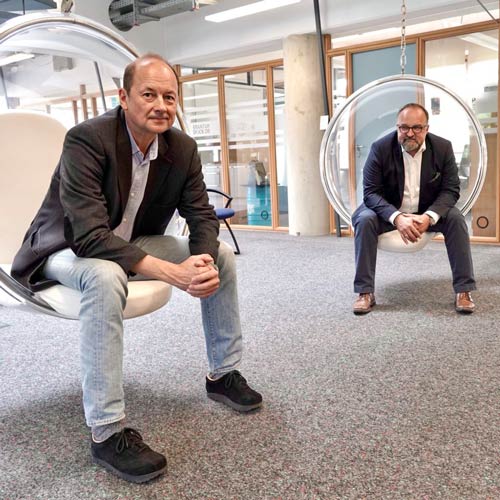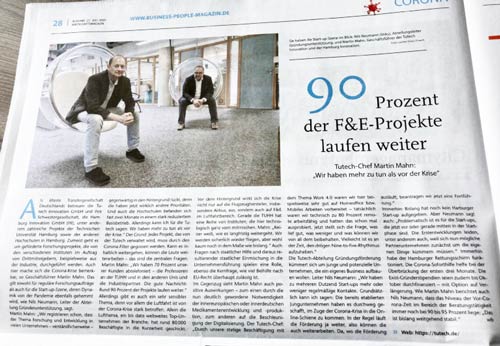
Photo: Jochen Kilian/Tutech
Tutech boss Martin Mahn:
“We’ve got more to do than before the crisis.”
Text: Wolfgang Becker, B&P
Looking after numerous projects at Hamburg Technical University and other universities in Hamburg is one of the responsibilities of Germany’s oldest tech transfer company, Tutech Innovation GmbH, and its sister company, Hamburg Innovation GmbH (HI). Most of these are funded research projects carried out by the various institutes on behalf of third-party funders, for example from industry. According to CEO Martin Mahn, the coronavirus crisis is making itself felt here, too. This is true both of regular research contracts and the start-up scene, whose dynamism is also being inhibited by the pandemic, says Nils Neumann, head of start-up support.
Martin Mahn: “We’re certainly noticing that the topic of research and development is currently taking a back seat in many companies, understandably, because they really do have other priorities at the moment. The universities were also operating on a greatly reduced basis for nearly two months. However, as far as Tutech’s concerned, we’ve got more to do than before the crisis.” The reason is that every project managed by Tutech has to be put through the corona filter. Can it continue as far as its content is concerned? Can people carry on working? These are the central questions. Martin Mahn: “We’ve rung round 70 per cent of our customers – the professors at TUHH and other universities and the industrial partners. The good news is that about 90 per cent of the projects are continuing.” However, one issue is particularly sensitive – aviation has been hit especially hard by the corona crisis. Lufthansa alone, one of the world’s top companies in the industry to date, has put around 80,000 employees on short-time working.
In this respect, the crisis is having an effect not only on the aircraft manufacturers, especially Airbus, but also on R&D in the aeronautics sector. TUHH in particular has a series of institutes that are involved here at the cutting edge of technology. Mahn: “No one knows what the long-term prognosis is. We’re bound to fly again, but probably not to the same extent as before.” Questions of state aid and resulting state interference in corporate governance also play a role, as does the key question of how much aid is permissible under EU law.
In return Martin Mahn also sees positive effects – on the one hand the necessity for developing and manufacturing medicines within Europe and within Germany that has now become clear, and on the other hand the acceleration of digitalisation. “Our constant attention to the topic of work 4.0 has meant that we’ve been very well prepared for home or mobile working,” says Tutech’s CEO. “In fact, we had 80 per cent technical capacity for working remotely and had already tried it out. Now the questions are, what went well, what went less well and what can we retain from all this? Maybe it’s time to get rid of the tedious nine-to-five pattern.”
Tutech’s Start-up Support unit looks after young and potential companies that want to grow their own businesses. “We have more or less regular contacts to several dozen start-ups,” says department head Nils Neumann. “Basically, I’d say that the young companies that have already become established have all managed to get online in the light of the corona crisis. As a rule, their funding’s continuing and so they can carry on operating. Where support’s run out. we’re now applying for an extension.”

The German version of this text appeared in the print edition of “Business & People” and at www.business-people-magazin.de/….
